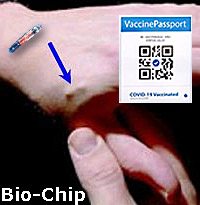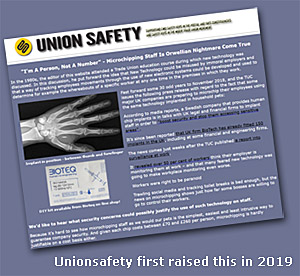 |
|
|
|
Just when you thought the only controversies over Covid-19 vaccines was the vaccine itself and the requirement or otherwise for Covid Vaccine Passports to be shown by everyone wishing to go shopping, eat in a restaurant, visit an art gallery or even attend a football match; now comes the Covid-19 Passport implanted into your hand! As COVID-19 continues across the globe with the spread of new variants, the need for people to prove they have been vaccinated in the UK by having a 'Covid Passport' accessible for inspection and it being even mandatory is becoming increasingly discussed in UK media and amongst politicians on the verge of bringing in such legislation. Could it be that soon you will not only get a syringe of vaccine injected into your aim, but then immediately followed by having a bio-chip implanted in your hand containing a scanable Covid Passport?
But, the Swedish company that dominates the market in Sweden, where more than 4,000 Swedes have embraced the technology; is Biohax International. The company where providing the financial sector in the UK with the mandatory wearing of 'bio-chips' by employees working in 'sensitive' areas. Biohax International, was also behind the microchips used by the Swedish railways company in 2018 when trialling their use in place of actual train tickets, is working with health companies to enable its microchips to contain personal health records, including prescription information and existing health conditions. An advantage being that if someone is brought unconscious to a hospital, a simple scan of the chip could give doctors information about the patient’s pre-existing conditions. Of course the 'chip' technology in itself is not new being used on pets to identify their owners. Companies use them to track deliveries, whilst some companies use mobile phones to track their delivery personnel. Though implanted chips have never been used to tag employees on a wide scale up until now, could this convenient and simple piece of tech be about to take over from using mobile phone technology to track employees, and from downloading documents such as train tickets, hotel reservations and yes; vaccine passports onto your mobile phone? The idea of implanting things under the skin may not be to everyone's taste. However, with the epidemic level in the popularity of face piercings, and even whole arm and body tattoos, is there much difference between that and having a micro-chip implanted under the skin between the palm and thumb that then allows you to access shops, theatres, museums and even buy train tickets and coffee with the waive of your hand? The real issue in the UK, is one of security and the idea that we are all being 'tagged' by authorities using health and security as the excuse. In Europe data security is taken seriously with the tougher data-privacy rules, as part of the General Data Protection Regulations, and ironically could also help the microchip trend in Sweden spread more rapidly across Europe. However, with the stated intention of the British Tory Government to completely re-write the GDPR now we have left the EU, and align it with the US's extremely weaker data protection regulations, this brings us to the sensitive concerns around our personal data security and our freedom of choice, and indeed of movement in the UK. With personal healthcare data being sold to insurance companies and private healthcare companies with or without express permission of the individual, data gathering via bio-chips is of serious concern. Ben Libberton, a microbiologist working for MAX IV Laboratory, is quoted as saying in an interview with Euronews in June last year: "The real issue is data handling, which will be an issue later on with how data is stored... if the data is not secure, someone can get your information and once it's out there, it's hard to get back." The worry is that anyone can read the information from the implanted bio-chip by scanning it with a reading device.
Argueing that it is for the employer's 'security' of data, products and to protect against industrial or financial espionage; prompts questions around the safety and security of any personal and sensitive data within your bio-chip itself being safe! The bio-chip implants work by using Near Field Communication (NFC) technology, as does contactless credit cards or mobile payments. They remain 'passive' until activated by a reader a few centimetres away, which then gathers a small amount of data which flows between the two devices in the form of electromagnetic waves. The information that other devices can read, goes only one-way, meaning the chips themselves cannot receive and store information themselves. Despite the claims that Near Field Communications required both transmitter and receiver to be within only a couple of centimetres apart, the widespread reports of people having their debit cards read at random by anything using the same technology with arbitrary payments being made without their knowledge until getting their bank statement; has spawned NFC blocking 'meshes' to be woven into wallets and other card carrying protective covers being developed to ensure security of a person's contactless card. The same concerns therefore apply with regard to your private medical data, of which 'Covid Passports' will just be starter for the widespread use of implanted micro-chips for numerous everyday activities where any forms of documentation or authorisation is needed - travel tickets, hotel reservations and yes the everyday use of contactless credit cards - only now in the form of a chip under the skin of your hand! Source: Euronews / CNBC / Unionsafety / See also: "I'm A Person, Not A Number" - Microchipping Staff Is Orwellian Nightmare Come True
|

 Well, that’s one use a Swedish company, DSruptive Subdermals which specialises in implantable microelectronics has been promoting for its implanted microchips according to reports from Europe. Epicenter and a few other companies were the first to utilise DSruptive Subdermals' chip implants broadly available to their employees some four years ago in 2017.
Well, that’s one use a Swedish company, DSruptive Subdermals which specialises in implantable microelectronics has been promoting for its implanted microchips according to reports from Europe. Epicenter and a few other companies were the first to utilise DSruptive Subdermals' chip implants broadly available to their employees some four years ago in 2017. 